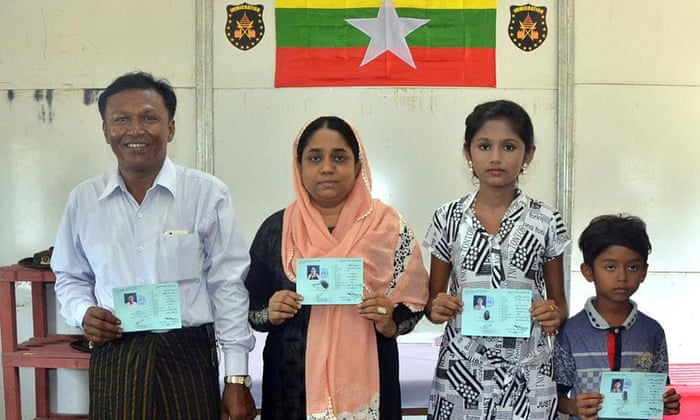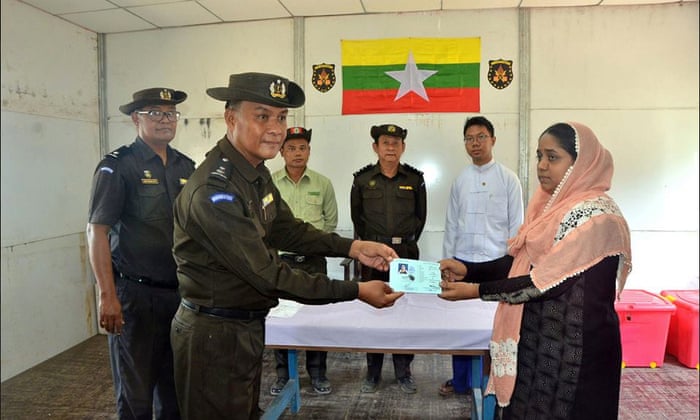A Brief Colonial History Of Ceylon(SriLanka)
Sri Lanka: One Island Two Nations
A Brief Colonial History Of Ceylon(SriLanka)
Sri Lanka: One Island Two Nations
(Full Story)
Search This Blog
Back to 500BC.
==========================
Thiranjala Weerasinghe sj.- One Island Two Nations
?????????????????????????????????????????????????Monday, April 16, 2018
First Rohingya refugees repatriated to Myanmar despite UN safety fears
Human rights groups slam move as publicity stunt while Bangladesh distances itself
Members of a Rohingya family show their ID cards. Photograph: Ministry of Information
 Michael Safi @safimichael-
Michael Safi @safimichael-Members of a Rohingya family show their ID cards. Photograph: Ministry of Information
Myanmar says it has repatriated the first Rohingya refugees from among nearly 700,000 who fled a crackdown in the country last year despite warnings from the United Nations that it is not yet safe to return.
Rights groups have criticised the announcement as a publicity stunt and Bangladesh has distanced itself, saying the repatriation was not part of the return process the two countries have been trying to start.
The stateless Muslim minority have been massing in squalid refugee camps across the border in Bangladesh since the Myanmar army launched a brutal campaign against the community in northern Rakhine state in August.
The Myanmar government announced late on Saturday that a family of refugees had become the first to be processed in newly built repatriation centres earlier that day.
“The five members of a family ... came back to Taungpyoletwei town repatriation camp in Rakhine state this morning,” said a statement posted to the Facebook page of the government’s information committee.

A member of a Rohingya family is issued with her ID card. Photograph: Ministry of Information
A member of a Rohingya family is issued with her ID card. Photograph: Ministry of Information
Bangladesh’s refugee commissioner, Mohammad Abul Kalam, told Agence France-Presse the family had been living in a camp erected on a patch of “no man’s land” between the two countries.
Several thousand Rohingya have been living in the zone since August, crammed into a cluster of tents beyond a barbed-wire fence that roughly demarcates the border zone between the two countries.
“They were not under our jurisdiction, therefore we cannot confirm whether there would be more people waiting to go back [to Myanmar],” he told AFP.
Bangladesh and Myanmar agreed a repatriation plan in January but its start has been repeatedly delayed as both sides blame the other for lack of preparation.
According to the Myanmar statement, immigration authorities provided the family with national verification cards, a form of ID that falls short of citizenship and has been rejected by Rohingya leaders who want full rights.
The family members were scrutinised by immigration and health ministry officials and the social welfare, relief and resettlement ministry provided them with “materials such as rice, mosquito netting, blankets, t-shirt, longyis [Burmese sarong] and kitchen utensils”, the government said.
Myanmar officials could not be reached for further details and the post did not say whether any more returns were expected soon.
The move comes despite warnings from the UN and other rights groups that a mass repatriation of Rohingya would be premature, as Myanmar has yet to address the systematic legal discrimination and persecution the minority has faced for decades.
The UN has said the military-led operations that started last August amount to ethnic cleansing, but Myanmar has denied the charge, saying its troops targeted Rohingya militants.
Andrea Giorgetta from the International Federation for Human Rights (FIDH) criticised the repatriation announcement as “a public relations exercise in an attempt to deflect attention from the need for accountability for crimes committed in Rakhine state”.
Last week, the most senior UN official to visit Myanmar this year, the assistant secretary general for humanitarian affairs, Ursula Mueller, said conditions in Myanmar were not conducive to the return of the refugees.
She cited a continued lack of access to health services, concerns among the Rohingya about protection and continued displacements. She also described conditions in camps for internally displaced people from previous bouts of violence as “deplorable”.
Many Rohingya refugees say they fear returning to a country where they saw their relatives murdered by soldiers and Buddhist vigilantes who drove them from their homes.
Boats with Rohingya from parts of Rakhine state have continued leaving Myanmar in recent months. The latest confirmed departure took place on Thursday.

